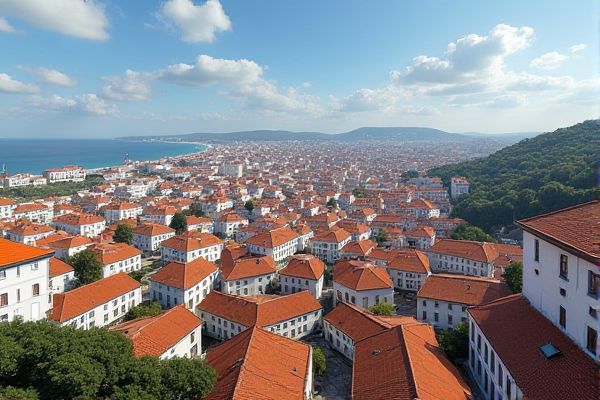
Cost of living in Portugal: Affordable housing options available. Lower utility bills than EU average. Groceries are reasonably priced. Healthcare is cost-effective. Dining out is budget-friendly. Public transport is economical. Internet costs are competitive. Lower-than-average entertainment expenses. Fuel costs are relatively high. VAT at standard rate of 23%.
Affordable housing options available.
Portugal offers various affordable housing options, including social housing initiatives managed by the Instituto da Habilitacao e da Reabilitacao Urbana (IHRU) and programs like the Programa de Arrendamento Acessivel (PAA), which encourage affordable rentals in exchange for tax exemptions. Additionally, regions like Penamacor and other interior areas provide extremely affordable property prices, with costs per square meter starting from around EUR399. For more detailed information on these options, visit the Expatica website to explore housing dynamics in Portugal and find a suitable living arrangement that meets your needs.
Lower utility bills than EU average.
In Portugal, utility bills, particularly for electricity, are notably lower than the average across the European Union. Portuguese household electricity prices average EUR0.2539 per kWh, marking a significant 19% reduction compared to the EU average of EUR0.3010 per kWh. This comparison highlights the cost efficiency for Portuguese residents regarding their electricity consumption. For more detailed insights, you can visit the full article on EURACTIV, which elaborates on this subject and the factors contributing to these lower rates.
Groceries are reasonably priced.
Groceries in Portugal are notably affordable, especially when it comes to essentials such as fresh produce, seafood, and meat. With a monthly budget of EUR200-300, residents can comfortably cover basic necessities and even some luxuries. For example, a kilogram of apples costs around EUR2.20, which is significantly cheaper compared to the US. While brand-name products might be pricier than in other countries, the overall cost for groceries remains reasonable. Households generally spend about EUR258 per month on groceries, including items like apples, bread, milk, and potatoes. This makes food and non-alcoholic drinks a manageable expense for many. For detailed insights on the cost of living, you can explore this analysis which compares Portugal's expenses with that of the USA, underlining the economic advantages of living in Portugal.
Healthcare is cost-effective.
In Portugal, Healthcare is highly cost-effective, with the public healthcare system being mostly free for citizens and legal residents. It involves minimal fees for services like doctor visits and diagnostics. Meanwhile, private health insurance is also relatively affordable, offering plans that range from modest monthly fees. For more detailed information and a comprehensive guide, you might want to explore the intricacies of healthcare in Portugal at InterNations. This balance between public accessibility and private affordability makes Portugal's healthcare system notable.
Dining out is budget-friendly.
Dining out in Portugal can be affordable, especially at local cafes and traditional restaurants, where a meal can cost around EUR10-EUR15, although prices in tourist areas and trendy restaurants can be higher. Budget-friendly options include family-run establishments, street food, and daily specials, making it possible to [dine out](https://www.lisbob.net/en/blog/the-real-cost-of-living-in-portugal-vs-expectations) regularly without breaking the bank.
Public transport is economical.
Public transport in Portugal is economical, with a single metro ticket costing EUR1.50 in Lisbon and EUR1.20 in Porto, and monthly passes available for around EUR30-EUR50 depending on the city. This makes it an affordable option for daily commuting. To learn more about the cost of living and other financial aspects in Portugal, you can explore the comprehensive insights provided at Immigrant Invest.
Internet costs are competitive.
In Portugal, internet costs are competitive, especially for broadband packages that often include television and landline services, with prices for typical plans being more economical compared to other European countries. For example, Digi's entry-level package of 1Gbps fibre with TV and a 50GB mobile line starts at just EUR26, significantly lower than competing options.
Lower-than-average entertainment expenses.
In Portugal, leisure and entertainment expenses are relatively low, averaging around EUR150 per month, making activities such as socializing, going to movies, and staying active both enjoyable and affordable. Options like discounted cinema tickets and happy hour specials further reduce costs. For more information, you can learn more about the Cost of Living in Portugal on HousingAnywhere's website.
Fuel costs are relatively high.
In Portugal, fuel costs are relatively high, with prices set to rise, reaching EUR1.583 per liter for regular diesel and EUR1.706 per liter for regular 95 petrol, reflecting an increase of 2.5 cents for both fuels. For more detailed information, you can visit the article on The Portugal News.
VAT at standard rate of 23%.
The standard VAT rate in Portugal, known as *Imposto sobre o valor acrescentado* (IVA) in Portuguese, is set at 23%, which applies to all goods and services that do not qualify for an exemption, 0%, or reduced VAT rates. For more details and comprehensive insights, you can visit the VAT Portugal page, an essential resource for understanding the intricacies of VAT in Portugal.
